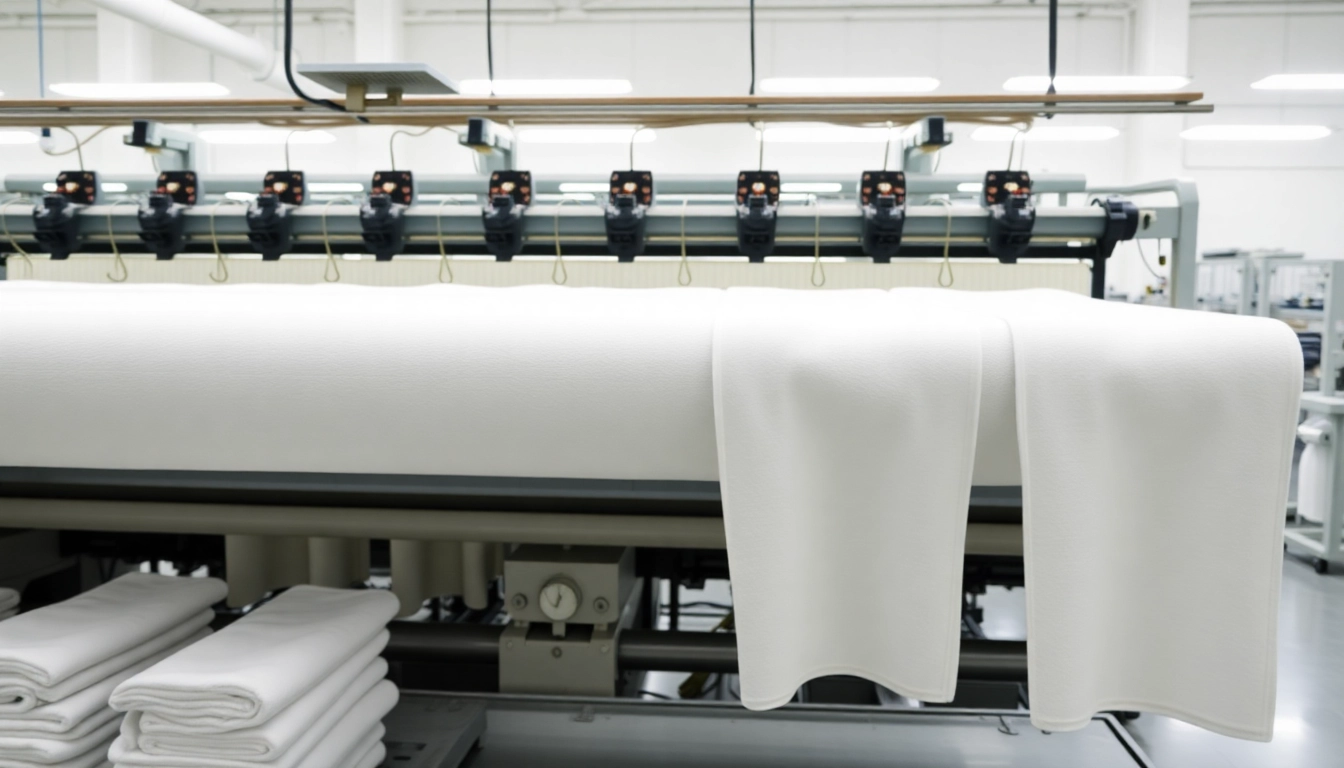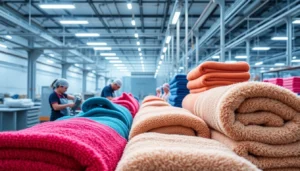Understanding the Towels Manufacturing Industry in the USA
In today’s competitive textile market, sourcing the right towels manufacturer in USA is crucial for brands seeking high-quality, sustainable, and reliable products. The US towels manufacturing industry is characterized by a blend of tradition and innovation, driven by evolving consumer preferences, stringent regulatory standards, and technological advancements. With a focus on premium quality and eco-friendly practices, American towel manufacturers are setting the benchmark globally.
As businesses look to establish or expand their market presence, choosing the right partner becomes more complex. Factors such as manufacturing capacity, material sourcing, sustainability, and compliance with industry standards are vital. To navigate this landscape successfully, understanding current market trends and regional manufacturing hubs is essential. This comprehensive guide explores these aspects to help you make informed decisions when selecting a towels manufacturer in USA.
Key Trends and Market Demand for Wholesale Towels
The demand for wholesale towels in the USA continues to grow steadily, driven by sectors including hospitality, fitness, hospitality, retail, and promotional industries. Recent trends highlight an increased consumer preference for eco-friendly and sustainable towels. Brands are increasingly seeking manufacturers that prioritize organic materials, environmentally conscious production processes, and ethical sourcing practices.
Furthermore, personalization and customization are becoming significant differentiators. Consumers and businesses alike want towels that reflect their brand identity through unique designs, logos, or special finishes. The pandemic has also accelerated the adoption of retail-direct-to-consumer models, boosting demand for premium, luxurious, and quick-turnaround products.
Understanding these market demands enables manufacturers to adapt their offerings. For instance, incorporating innovative fibers like bamboo or recycled polyester aligns with sustainability goals, while flexible MOQ (minimum order quantities) and faster lead times address supply chain needs.
Regulatory Standards and Quality Certifications
The US textile industry is subject to rigorous regulatory standards to ensure safety, quality, and environmental compliance. Leading manufacturers often hold certifications such as OEKO-TEX Standard 100, GOTS (Global Organic Textile Standard), and ISO 9001. These credentials assure buyers that the towels meet strict criteria for chemical safety, organic material sourcing, and manufacturing consistency.
Compliance with the Consumer Product Safety Improvement Act (CPSIA) and regulations imposed by agencies like the Federal Trade Commission (FTC) reinforces product credibility. Manufacturers that prioritize transparency and hold relevant certifications are better positioned to serve brands demanding high standards for their end-users.
Ensuring your manufacturer adheres to these standards and maintains active quality management programs is essential for long-term success and brand reputation.
Major Regions and Manufacturing Hubs in the USA
Throughout the United States, key regions serve as textile and towel manufacturing hubs. The Northeast, particularly New York and Connecticut, boasts a rich history of textile innovation and luxury towel production, often catering to high-end markets. The West Coast, especially Los Angeles, is known for its custom towel manufacturers, rapid prototyping, and innovative textile solutions.
Southern states like Georgia and North Carolina offer large-scale manufacturing facilities with advantages in cost and capacity, serving wholesale and bulk orders efficiently. Midwest regions contribute with their integrated supply chain networks and proximity to raw material sources.
Understanding the regional strengths helps brands align with manufacturers that match their volume requirements, quality expectations, and sustainability practices. For example, if your focus is on luxury, region-specific advantages such as premium fibers or bespoke craftsmanship from certain hubs can be pivotal.
Choosing the Right Towels Manufacturer in USA for Your Brand
Factors to Consider: Quality, Capacity, and Customization
When selecting a towels manufacturer, quality assurance must be the top priority. This includes examining fabric durability, softness, and safety standards. Visiting manufacturing facilities or requesting samples can provide insights into craftsmanship and consistency.
Capacity is equally important—ensure the manufacturer can meet your current demand and scale for future growth. Communicate your order size, lead times, and flexible production schedules upfront to mitigate risks of shortages or delays.
Customization options such as unique sizes, colors, weaves, and branding opportunities (embossed, embroidered, or printed logos) should align with your branding strategy. A manufacturer experienced in private labeling and specialty finishes will provide a competitive edge.
Evaluating Sustainability and Material Sourcing
Sustainable practices are integral to modern textile manufacturing. Seek manufacturers committed to eco-friendly practices like water and energy conservation, waste reduction, and the use of organic or recycled materials. Transparent supply chains, certifications like GOTS, and adherence to fair labor practices reflect corporate responsibility.
Material sourcing directly impacts product quality and sustainability claims. Producers sourcing fibers within the USA or from certified global suppliers ensure compliance with environmental standards and bolster your brand’s eco-credentials.
Implementing eco-friendly initiatives not only appeals to eco-conscious consumers but may also provide competitive advantages, grants, or tax incentives.
How to Maintain Supply Chain Efficiency and Reliability
Effective communication, well-established logistics networks, and contingency planning are fundamental for smooth operations. Transparent lead times, real-time order tracking, and flexible fulfillment options reduce delays and inventory shortages.
Build relationships with multiple manufacturers or suppliers to diversify risk. Additionally, investing in long-term partnerships facilitates better pricing, priority scheduling, and shared innovations.
Regular quality audits and feedback loops ensure continuous improvement and timely resolution of issues, maintaining your brand’s reputation for reliability.
Building Strong Partnerships with US Towel Manufacturers
Communication, Lead Times, and Order Flexibility
Clear, consistent communication is the cornerstone of successful manufacturing partnerships. Establishing detailed specifications, production schedules, and responsive channels ensures alignment. Negotiating flexible MOQs and lead times upfront allows for adaptability in fluctuating market conditions.
Leverage digital tools like ERP systems or dedicated portals to streamline order management and maintain transparency throughout the process.
Quality Control Processes and Sample Evaluation
Thorough quality control (QC) procedures should include pre-production samples, in-line inspections, and final audits. Request samples for evaluation based on fabric softness, colorfastness, and stitching integrity. Develop a detailed checklist aligned with your quality standards.
Implementing statistical process controls (SPC) and holding periodic audits reinforce quality consistency and reduce defect rates.
Long-term Collaboration for Brand Growth
Building a long-term relationship based on trust, transparency, and mutual benefit leads to better pricing, priority attention, and shared innovations. Collaborate on product development, sustainability initiatives, and branding efforts to differentiate in the marketplace.
Regular performance reviews and open feedback channels foster continuous improvement and adaptability to changing consumer trends.
Innovations and Trends in Towel Manufacturing
Eco-friendly Materials and Sustainable Practices
The future of towel manufacturing lies heavily in sustainability. Innovative eco-friendly fibers like bamboo, hemp, recycled polyester, and organic cotton are gaining popularity. Processes such as low-impact dyeing, waterless finishing, and renewable energy usage are becoming industry standards.
Implementing sustainable practices not only reduces environmental impact but can also create unique product features appealing to conscious consumers.
Technological Advances in Textile Production
Automation, AI, and IoT technologies enhance efficiency, quality, and customization capabilities. Automated knitting, sewing, and dyeing reduce labor costs and improve precision. Smart textiles with moisture-wicking, antimicrobial, or temperature-regulating properties are redefining what towels can be.
3D design and rapid prototyping enable faster development cycles, helping brands stay ahead of market trends.
Design and Customization Trends for Competitive Advantage
Unique textures, personalized embroidery, innovative prints, and functional features like cooling or quick-dry fabrics are differentiators. Incorporating contemporary aesthetics such as geometric patterns or minimalist branding can enhance visual appeal.
Partnering with manufacturers that provide advanced customization options is vital for brands looking to stand out in a crowded marketplace.
Measuring Success and Scaling Your Towel Business in the USA
Key Performance Indicators (KPIs) for Manufacturing Efficiency
Monitoring KPIs such as defect rate, lead time adherence, order accuracy, and customer satisfaction helps optimize operations. Data-driven insights enable proactive improvements and better forecasting.
Automation of quality control and inventory management can dramatically improve efficiency and reduce costs.
Effective Marketing and Distribution Strategies
Developing a strong online presence, leveraging B2B platforms, and participating in trade shows expand reach. Building brand narratives around quality, sustainability, and customization resonate with targeted audiences.
Utilize strategic partnerships with distributors and retailers to facilitate faster market penetration and broad visibility.
Scaling Production and Expanding Market Reach
Invest in scalable manufacturing infrastructure and diversification of product lines to meet growing demand. Entry into new regional or international markets may require establishing local partners or subsidiaries.
Data analysis and customer feedback inform product development and innovation, ensuring relevance and competitive positioning.



